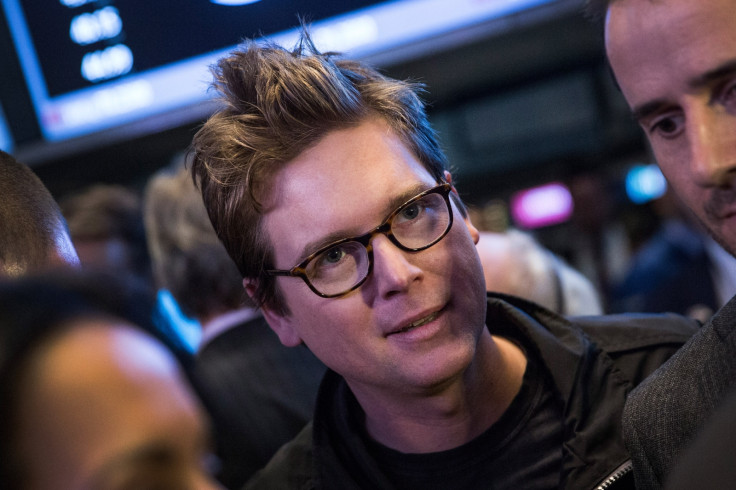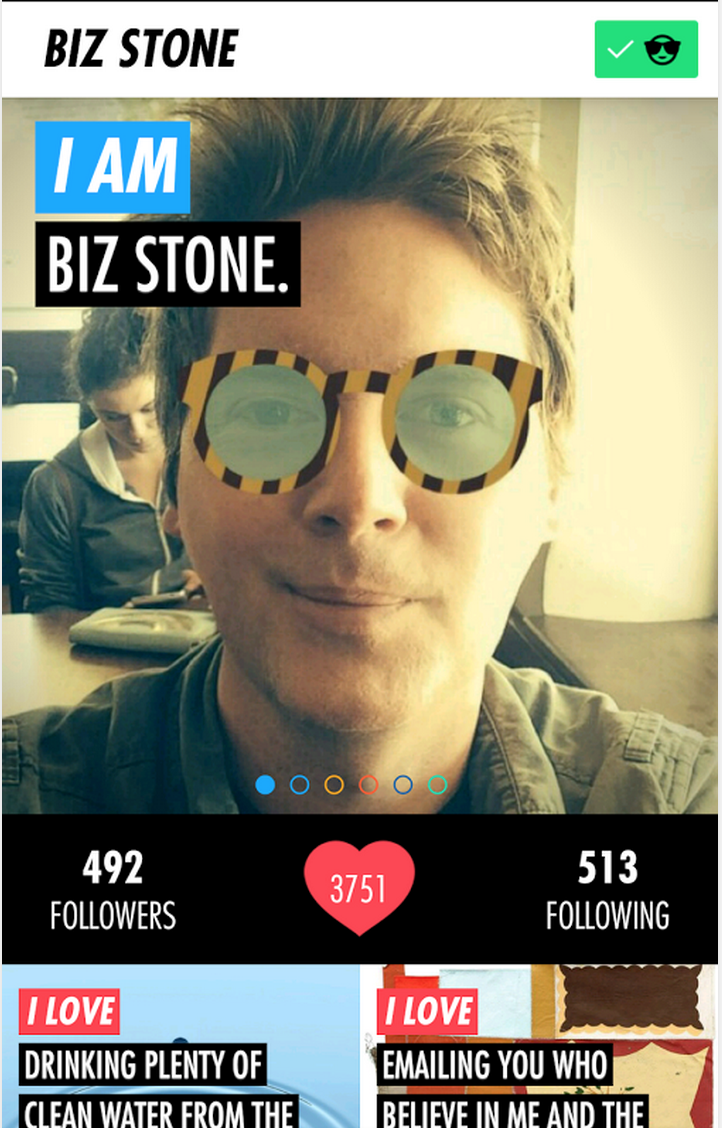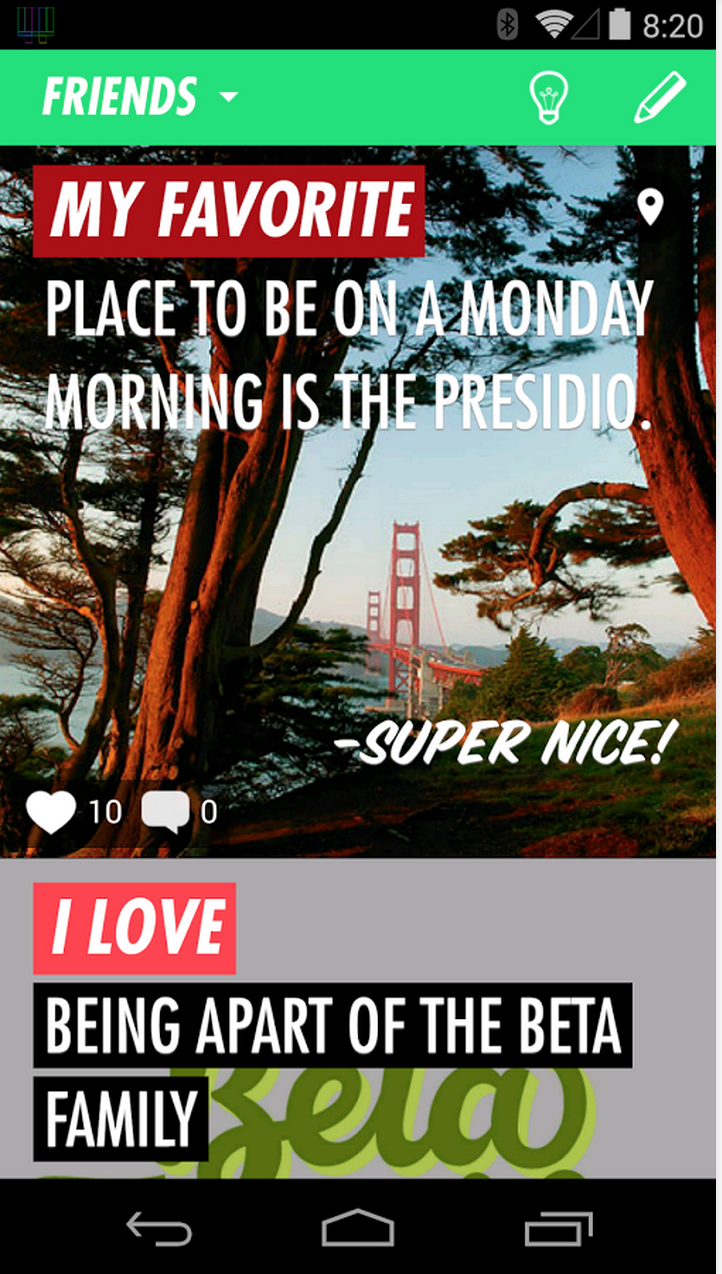Biz Stone is Super excited about 'sickeningly hallucinogenic optimistic' future

Biz Stone is one of the co-founders of Twitter and is the quintessential Silicon Valley hippy/tech entrepreneur.
He lives in a tiny called in Marin County near San Francisco, which doesn't even have a postal system.
He is a vegan and has a philanthropic foundation set up to help fund charitable projects in areas such as education, the environment and animal welfare. He is also thought to be worth more than $200m (£130m).
Stone is one of the "coterie of internet monopolists" that author Andrew Keen claims have gotten rich while failing to deliver on the promise of the internet.
It is therefore no surprise when he tells IBTimes UK that his latest venture – a visual social network called Super – has the lofty and vaguely insulting goal of "inspiring empathy" and is Stone's effort to help create what he calls a "sickeningly hallucinogenic, optimistic" future.
That future, in Stone's mind, is one where people are citizens of Earth rather than any particular country and work together for to create a better world. That utopian future is hundreds of years away Stone admits, but he wanted to start doing something about it now and the result was Super.
Cryptically, the Twitter co-founder also admitted he is developing a TV series in this area, but said he was not able to talk about that at the moment.
Super fun

What is jarring however is just how much fun Super is and how convincing Stone is at making me believe that the future is day-glo bright.
Open Super after hearing Stone's pitch and your immediate reaction will be that you have opened the wrong app. It is bright – almost gaudy – with brash colours and strong opinions flooding your smartphone screen.
The design is based on the work of American feminist conceptual artist Barbara Kruger. Stone shows me some of Kruger's work and is clearly still blown away by her art, which primarily consists of black-and-white photographs overlaid with declarative captions that promote debate.
It led Elle magazine to say Super would be what Instagram would look like if it was designed by Kruger, while one of my colleagues more pithily described it as a way of creating memes.
From fart jokes to toppling despotic regimes
Everything about Super is positive – from its name to the love (not simply likes) you send people when they post an image.
The premise is simple.
Pick a category from the 20 or so on offer – which include the likes of "The best", "I can't stand", "That Moment When" or "Newsflash"; add your own text; and choose a picture – either one from your own collection or one provided by Super based on what you have written.
Stone says that the categories are constantly changing but there is always only one negative option ("The worst", "I can't stand") along with dozens of upbeat salutations, which are there to inspire positivity.
This colourful, upbeat atmosphere is all a deliberate tactic on the part of Stone and his co-founder Ben Finkel:
"The tack we are taking is try to create something fun. If it is fun more people are likely to use it. If a lot of people use it, it has the potential to become important. Don't try and build something noble first."
Stone rolls out the line he has used in interviews previously to describe this approach:
If you want to build a platform capable of toppling despotic regimes, it also has to support fart jokes.
Stone believes that by allowing the platform to be used for everything from deep and meaningful thoughts to fart jokes, it will get people using it more and allow them develop a muscle memory around the app, which is what helped Twitter become so popular.
From Jelly
Super emerged from Jelly, an app created by Stone and Finkel after the former left Twitter in 2011. Jelly was a question-and-answer platform that quickly gained one million downloads in just two days, but six months was declared a flop as too few people were asking questions.
Utilising what Stone calls his "bright spot theory", the pair focused on the one area where Jelly was a success – that people really wanted to express their opinions. Expressing those opinions using text on top of images is not simply about fun, there is science to back up Super's approach:
I said let's make this thing crazy because I am sick of all this Swiss minimalism
"Basically we said lets make it as bold, artistic and fun and emotive as possible because there is actual science behind this. Both emotional and cognitive comprehension is improved by 43% when you combine an image with just a phrase or a word. Everyone knows this, you don't need science to back this up, it's the foundation of the entire advertising industry and any book you have ever read on giving a good PowerPoint presentation will tell you this," Stone said.
Stone is sick of the over-designed and minimalist messaging apps and social networks that crowd app stores today, and wanted to create something entirely different. The entrepreneur believes "the brand and the popiness, the colour and the craziness" of Super have helped it gain traction.

"I said let's make this thing crazy because I am sick of all this Swiss minimalism. Everything has got to be so precious. I said let's break all the rules. Everything these days has got to be so beautifully designed, and in my experience it doesn't really matter if it is ugly and janky as long as people like it. You can make it pretty later."
The current trend for a more dystopian view of the future in science fiction films and books is not something Stone is a big fan of, preferring the aspirational science fiction epitomised by the likes of Star Trek, and the reason is simple:
"I am a believer that life does imitate art to an extent. The more you say [a dystopian future] is going to happen the more likely it is going to happen. So if you say good things and you get 12-year-old boys and girls interested in math and science and towards a better future then you may end up in that world."
By using Super, the hope is to have people from all corners of the world communicate in a "more nuanced way" and begin to understand each other's point of view – the result of which Stone thinks could be a brighter future:
The beginning of that is empathy for another person. The ability to walk in another person's shoes half way around the world understand their point of view, understand why they are angry, what makes them tick. Empathy softens the earth for collaboration. If you can empathise with someone, you are less likely to want to kill them and more likely to want to collaborate with them.
Cynical
If Stone does want Super to have a real impact on the world – in the same way Twitter had in situations like the Arab Spring – then it is likely that it will need to adapt in the future, because while it is the perfect platform for fart jokes as it is, it is not going to be topple any despotic regimes in its current guise.
That is something Stone has not really thought about, though he admits that maybe it would be necessary to change if the craziness holds the company back.
Stone does not want to prescribe what Super will be used for or who will use it, and seems happy to see it evolve organically depending on what the users want to use the service for.
It is easy to be cynical about an app with the highfalutin goal of "inspiring empathy" created by a Silicon Valley hippy with over $200m in the bank, but Stone is an irrepressibly likeable character and his outlook on life is a refreshing change.
Super is a jarring experience at first, but the more you use it, the more you engage and the more you get the sense that this could have potential.
© Copyright IBTimes 2024. All rights reserved.







